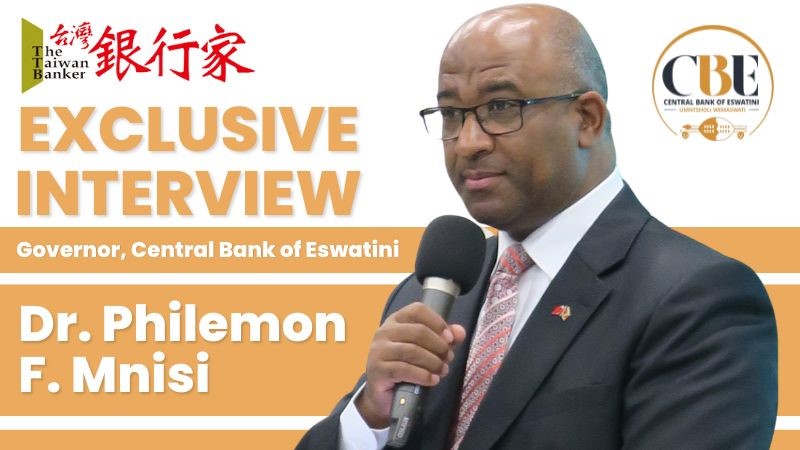Banker's Digest
2024.07
Eswatini: Taiwan “far down the line” in financial development

Under the New Southbound Policy, Taiwanese manufacturers and banks have been actively pursuing business in Southeast Asia. Taiwan’s deepest bilateral relations are however not with these countries, of course, but with its diplomatic allies scattered across several continents. Is it missing an opportunity on the world’s stage? Philemon Mnisi, Governor of the Central Bank of Eswatini (CBE), invited Taiwan to his nation during his May visit to Taiwan, which coincided with the inauguration of President William Lai. “Why are Taiwanese banks not seeing an opportunity in Africa or setting up in Eswatini?” he asked. Eswatini is one of the 12 countries which still recognize Taiwan on a formal basis. “Taiwan is friends with Eswatini,” he emphasized, answering his own question. “Come set up in Eswatini. And don't see Eswatini as a small territory. See us as land linked, rather than land locked. Because when you come to Eswatini as Taiwanese companies, you have got trusted friends. We have got the bilateral relations at a diplomatic level....but you do need to deal with the language issue, because this is the issue that I think has caused Taiwanese companies not to grow.” Better late than never Over the course of several days, the Eswatini delegation took place in a variety of exchange activities. King Mswati III went shrimp fishing with President Lai. CBE signed MOUs with the Taiwanese central bank, the Taiwan Stock Exchange, the Taiwan Carbon Solution Exchange, and finally with TABF. Each of those institutions will help guide the development of Eswatini, explained Mnisi at the latter signing ceremony. TABF will collaborate with CBE on issues affecting overall banking sector, including innovation, technology, anti-money laundering, and cybersecurity, among others. Eswatini has sugar and forestry industries which are complimentary with Taiwanese consumption. It has recognized Taiwan for 55 years, since 1968, but so far has not concluded any partnerships involving the financial sector. “Better late than never,” said Mnisi. Like many other African nations, Eswatini aims to improve its economic activity and financial inclusion. The World Bank notes that “access to credit for Small and Medium Enterprises (SMEs) is constrained by limited digitization of enterprise cash flows, weak secured transaction and insolvency regimes, high collateral requirements, and limited quality of credit information.” Few Micro, Small, and Medium Enterprises (MSME) start their businesses using formal credit, especially for women-owned businesses. Taiwan has the advantage of having started its development journey earlier, as well as relatively strong technological infrastructure. Moreover, its economy is also highly concentrated in the SME sector, and its financial services have developed accordingly to serve these customers. “Yes, in Eswatini, we have also developed our financial inclusion through mobile money payments, mainly in the payment space,” said Mnisi. “It is currently at 87% people that have got access to finance. But we need to deepen this. We need to deal with other products like credit, insurance, and more wider offerings of banking services other than just ability to pay, which we have realized that through the mobile payments, etc. So we want to drive this agenda, especially not only just the retail space, but also for SMEs.” “One of the areas where we believe we will learn a lot from Taiwan is that you are far down the line in terms of financial inclusion. And you have used and leveraged technology to realize this.” Starting from the ground up Eswatini could benefit from guidance on a variety of matters, said Mnisi, ranging from the profound to the basic. In addition to the subject areas with direct relevance to banking sector modernization, TABF has also developed useful expertise in modern course delivery through digital means, particularly since the pandemic. Mnisi also made note of the design of FE62, the financial museum and café housed within the TABF headquarters, which feature a modern style and futurist themes. Under authorization from Mswati, CBE is planning to open a Center of Excellence next year and will seek guidance from TABF during a forthcoming return visit. In return, Eswatini can offer Taiwan some degree of access to international organizations. “We see the reports [organizations like the IMF] work with, and we know the kinds of questions they ask.” This awareness can prevent Taiwan from inadvertently diverging too far from evolving international practices. Taiwan has certainly made great progress in recent years by solidifying its relationships with non-formal allies, but some benefits are difficult to realize outside of formal partnerships. The new MoU will help Taiwanese banks learn more about a continent on which they have scant experience.



